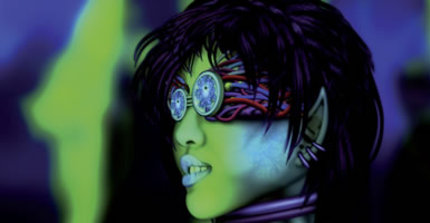Sci-Fi London 2012: STRANGE FRAME Review

In the distant future, humanity have abandoned the polluted Earth and colonized the moons of Jupiter. This has created an underclass of indentured slaves, as well as genetic mutations both for business and pleasure. In a street riot, middle-class-girl and sax-player Parker meets Naia, escaped slave and musician. The two quickly fall in love and form a band. Naia is spotted by a typically yet deliciously evil music producer, who spirits her away from Parker. Parker, in desperation of love, hooks up with space pirates Philo and Reesa to win back her lady.
Inspired by anime, manga, bande dessinee, and comics, the animation is hand-drawn, airbrushed, and composited together in such a way that will make you forget, or at least find cold, any CGI animated work. Futuristic cities are shown in all their grittiness, and human bodies (or somewhat human bodies) provide the colour, stylized yet never seeming fake. The mixture of styles, and the constant flow of varying colour and texture should be difficult to watch, but it isn't. You can feel the hands behind the work with every gesture, down to the smallest detail. I almost wished I could watch it in slow motion, to catch all these details. In fact, this is probably the closest I've seen a film come to actually replicating a comic book or graphic novel page. To some degree, it replicates the flatness; but instead of abandoning this idea, it pumps the images with air and music to make them three-dimensional. This is very hard to describe in words; you have to see it on the screen. But it feels, literally, as though the page started moving in front of you.
The management of the dense imagery, to such that I never felt overwhelmed, is a credit to Hajim and Doty's story. The animation matches the story, which reads as both comic book and folk tale, a kind of contemporary Arabian Nights story infused with rock music. It is not a typical 'musical'; it is not told entirely in song, nor does the action stop to allow for a song. Instead, the music is part of the storytelling, punctuating the sensuous narration by Parker. This kind of storytelling is rare: it neither panders nor talks down to the audience. Rather, it moves naturally between talk and song, flowing through the mind the way dream-thought does, switching gears without effort, seamless.
The vocal cast is pretty amazing: Ron Glass, Alan Tudyk, Juliet Landau, Tim Curry, Michael Dorn, George Takei ... obviously there is a pattern here, sci-fi and music actors, but each one fits their character. Though the real credit goes to Claudia Black as Parker, by whom the audience is carried; that's a voice you could listen to all day, the kind you wish would narrate your dreams.
Strange Frame is a rare film: inspiration by other forms is noticeable, but it is not merely repetition or homage. It is a dreamscape, one that does not shy aware from the ugly, yet celebrates the beautiful.

Do you feel this content is inappropriate or infringes upon your rights? Click here to report it, or see our DMCA policy.






